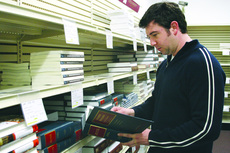For some students, the beginning of each semester brings a decision: Cheese or textbooks.
With the cost of textbooks – sometimes one alone – costing hundreds of dollars, there are some students and professors on campus looking at alternatives to the semi-annual tradition of standing in line to shell out the money that will buy them all their required textbooks.
“This is ridiculous,” said Samantha McKinney, visual arts senior, as she walked the aisles of the Loyola Bookstore. “I should just go without books like I did my sophomore semester.”
McKinney said she went her sophomore fall semester without buying any textbooks, but it didn’t work out well. “My semester without books was awful, I didn’t have any information and it caused me to be very behind,” she said.
“I didn’t have any money, and books are outrageously expensive; either I could eat lunch for two weeks or buy a math book,” McKinney said. She said that her math book cost as much as the imported French cheese she liked to buy.
McKinney wasn’t the only one in the bookstore expressing sentiments of disgust and surprise. Nicholas Albanes, an international business sophomore taking 18 credit hours this semester purchased most of his books at the bookstore. “It’s rough. Even though my parents pay for half, I’ll still end up paying $300,” Albanese said.
It is quite easy to walk out of the bookstore wondering: Why aren’t textbooks more affordable?
The Loyola bookstore is not owned by Loyola University but by College Book Stores of America, a bookstore manager hired through contract. The store is under contract with Loyola, and they must pay rent and utilities.
According to Carol Knight, the manager of the bookstore, books usually come from different publishing houses and wholesalers. “There is no one source,” she said. Used books come from the wholesalers, which Knight said the bookstore tries to use as much as possible.
All the prices of new books are determined by whatever the publishing house wants to charge, not individual bookstores, Knight said. The mark up on textbooks is 20 to 25 percent. “A $60 book at 20 percent is $72. … We don’t gouge, 20 to 25 percent is not a gouge at all,” Knight said.
The bookstore is a retail business and cannot buy from other retail businesses such as Amazon.com or Abebooks.com to provide cheaper alternatives, Knight said. Students, however, can and often do buy books online.
Some Loyola professors are very understanding of the financial burden students face when purchasing textbooks.
David Myers, mass communication professor, said he has begun offering alternatives to students in his Mass Communication Theory and Research classes. He has been teaching the class for about 20 years and requires three texts that cost in the range of $250-$300 at the bookstore.
He began offering alternative solutions after receiving several complaints on his student evaluations. “A big concern for me was seeing students in class without books,” he said.
Myers started recommending websites such as Amazon.com and has adapted his course material differently to allow students a week or two to get their books in. Myers also allows students to use earlier editions of textbooks and puts things on reserve in the library, which can also greatly reduce costs.
McKinney said that buying online was how she “got back on track. I would never want to choose between creamy goat cheese and algebra again.”
Lizzie Ford-Madrid can be reached at [email protected].







